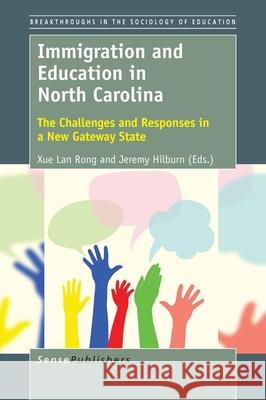Immigration and Education in North Carolina » książka
Immigration and Education in North Carolina
ISBN-13: 9789463008082 / Angielski / Twarda / 2017 / 282 str.
Immigration and Education in North Carolina
ISBN-13: 9789463008082 / Angielski / Twarda / 2017 / 282 str.
(netto: 420,89 VAT: 5%)
Najniższa cena z 30 dni: 423,64
ok. 22 dni roboczych.
Darmowa dostawa!
Fourth-wave immigration, with its vast economic, ethnic, cultural, linguistic, and religious diversities, have brought new dynamics into the existing social and demographic structures and added both opportunities and challenges to educational systems in North Carolina, a Southern U.S. state with the fastest growing rate of foreign-born population in the nation in 1990-2010 and unique geopolitical history. This book brings together 17 scholars who have extensive experience working with immigrants in North Carolina and represent a wide range of educational expertise. Together, their studies illustrate the intersections between historical contexts (geopolitical, historical constraints), structural factors (power, policies and laws, institutions and organization), cultural issues (philosophies, ideologies, identities, beliefs, values, and traditions), and immigrant students' characteristics on the development of educational practices, policies, reforms, and resistance. Most importantly, studying how North Carolina education systems and actors adapt to meet the challenges may offer valuable opportunities for researchers to understand the transformation of educational systems in other new gateway states. Collectively, studies in this book deconstruct the framework of the traditional hierarchical assimilation and linguisticism policies in recasting the concept of becoming Americans in the New South. The authors utilize frameworks that recognize the structural barriers that disadvantage immigrants in new gateway states but also position youth, families, and communities as possessing and utilizing valuable resources to promote educational access and achievement. In this sense, this book contributes significantly to major contemporary empirical and theoretical debates relating to educating immigrant children. It is our hope that this critical dialogue will continue at a national platform to promote discussion of these timely issues.
Fourth-wave immigration, with its vast economic, ethnic, cultural, linguistic, and religious diversities, have brought new dynamics into the existing social and demographic structures and added both opportunities and challenges to educational systems in North Carolina, a Southern U.S. state with the fastest growing rate of foreign-born population in the nation in 1990-2010 and unique geopolitical history.This book brings together 17 scholars who have extensive experience working with immigrants in North Carolina and represent a wide range of educational expertise. Together, their studies illustrate the intersections between historical contexts (geopolitical, historical constraints), structural factors (power, policies and laws, institutions and organization), cultural issues (philosophies, ideologies, identities, beliefs, values, and traditions), and immigrant students’ characteristics on the development of educational practices, policies, reforms, and resistance.Most importantly, studying how North Carolina education systems and actors adapt to meet the challenges may offer valuable opportunities for researchers to understand the transformation of educational systems in other new gateway states. Collectively, studies in this book deconstruct the framework of the traditional hierarchical assimilation and linguisticism policies in recasting the concept of becoming Americans in the New South. The authors utilize frameworks that recognize the structural barriers that disadvantage immigrants in new gateway states but also position youth, families, and communities as possessing and utilizing valuable resources to promote educational access and achievement. In this sense, this book contributes significantly to major contemporary empirical and theoretical debates relating to educating immigrant children. It is our hope that this critical dialogue will continue at a national platform to promote discussion of these timely issues.











